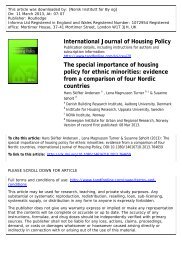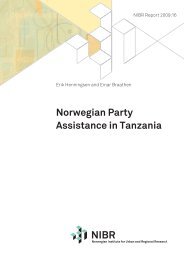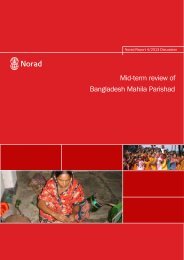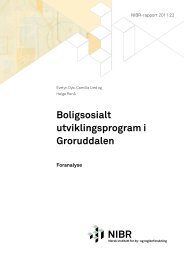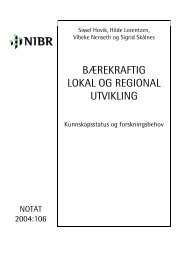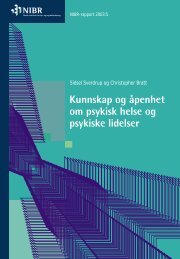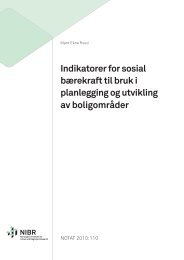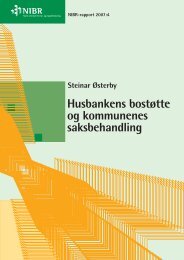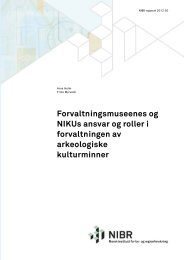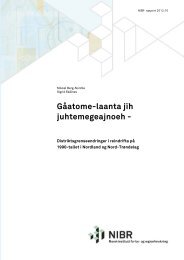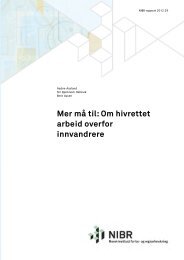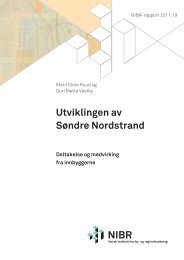Evaluation of the Southern and Eastern Africa Regional Centre for ...
Evaluation of the Southern and Eastern Africa Regional Centre for ...
Evaluation of the Southern and Eastern Africa Regional Centre for ...
- No tags were found...
Create successful ePaper yourself
Turn your PDF publications into a flip-book with our unique Google optimized e-Paper software.
any elective body, whe<strong>the</strong>r - Parliament, various commissions, Supreme court, etc.,can be <strong>of</strong> <strong>the</strong> same gender. The implications are that women should be at least onethird,whereas currently only 10 per cent, i.e. 22 out <strong>of</strong> 224 seats in Parliament, <strong>for</strong>example, are women. The Federation <strong>of</strong> Women Lawyers (FIDA, involvinggraduates), has held a number <strong>of</strong> activities, including a court case, whose verdict isbeing awaited. FIDA also held a one day workshop to sensitise all political parties togender legislative <strong>and</strong> policy framework. <strong>Centre</strong> graduates, such as Ruth Aura <strong>and</strong>o<strong>the</strong>rs, have been integral to <strong>the</strong> process.Case Two: Legal actionAno<strong>the</strong>r area <strong>of</strong> impact concerns <strong>the</strong> deliberations involved in court judgements, <strong>and</strong>legal assistance in Zimbabwe. Again, analysing responses from <strong>the</strong> survey <strong>and</strong>interviews makes apparent what was identified earlier as <strong>the</strong> ‘gaps’ in current legalpractice, <strong>and</strong> <strong>the</strong> need <strong>for</strong> a ‘gender lens’. An experienced labour court judge sharedsome insights into <strong>the</strong> impact <strong>of</strong> <strong>the</strong> course in her work (see box below). When oneconsiders that <strong>the</strong> judge makes up to 20 judgements on average by <strong>the</strong> month’s ends–albeit on a diverse range <strong>of</strong> issues not always gender related- <strong>the</strong> impact is apparent<strong>for</strong> gender sensitive deliberations.‘The impact <strong>of</strong> <strong>the</strong> course has been massive. I can now [she was a judge be<strong>for</strong>e <strong>and</strong> after <strong>the</strong>Master’s] link my work to <strong>the</strong> course <strong>and</strong> come up with a proper judgement in which a womanspeaks up. It helps to underst<strong>and</strong> <strong>the</strong> background <strong>and</strong> context <strong>of</strong> clients. A legal mind would notnormally see <strong>the</strong> link between <strong>the</strong> <strong>of</strong>fence <strong>and</strong> <strong>the</strong> complaint. My observation is that <strong>the</strong> hierarchyare all men. One case involved a women who was a security guard. There was a work policy thatwoman do not do night shifts. But she was told to do so <strong>and</strong> she said that due to advances <strong>of</strong> aman, which she refused, she was charged with misconduct. But I saw that <strong>the</strong>re were shadows[over this appearance <strong>of</strong> misconduct] <strong>of</strong> sexual harassment.’Mrs. Betty Chidziva (Labour Court Judge).A <strong>for</strong>mer magistrate who had many years’ experience <strong>and</strong> had since become a DPhilstudent following her Master’s degree at <strong>the</strong> <strong>Centre</strong>, confirmed <strong>the</strong> shift in approachthat underpins such examples. When a magistrate, she would do things repetitively<strong>and</strong> in a mechanical fashion, <strong>and</strong> never asked why a women did a certain thing. Shegenerally did not go into factors that had shaped women’s experiences <strong>and</strong> preferredbe<strong>for</strong>e <strong>the</strong> course to merely apply sentencing options. These ‘gaps’ were revealedfollowing <strong>the</strong> course.Lawyers in civil society legal aid provision also expressed <strong>the</strong> shift in approach <strong>and</strong>how issues were being framed be<strong>for</strong>e <strong>and</strong>after <strong>the</strong> Masters. Some reflected uponwomen’s perceptions <strong>of</strong> courts <strong>and</strong> <strong>the</strong>legal process as in itself ‘terrifying’. Since<strong>the</strong> course she claimed it is easier to relateto women’s issues, to underst<strong>and</strong> <strong>the</strong>ircontext, cultural factors <strong>and</strong> relationships<strong>and</strong> how option may influence each. Anexample <strong>of</strong> how this had improvedinterpretation <strong>of</strong> <strong>the</strong> law is seen in <strong>the</strong> boxadjacent.‘A client came to see me. She was in apolygamous marriage. The husb<strong>and</strong> hadsold <strong>the</strong>ir house, without consulting her,or, giving her anything from sale. He pu<strong>the</strong>r out in ano<strong>the</strong>r house. He <strong>the</strong>n wantedto sell that one as well- but she had notbenefited previously <strong>and</strong> he had not been<strong>the</strong> care-giver <strong>for</strong> <strong>the</strong>ir children. Shespoke with him <strong>and</strong> he agreed to give hermoney from sale. Getting women’sexperiences <strong>and</strong> exploring this <strong>and</strong> <strong>the</strong>irconcerns <strong>and</strong> fears, was what I got fromthis course. The women didn’t want adivorce but just wanted a fair share. It is<strong>of</strong>ten not about law but experiences. Shegot fair compensation’.Portia Mabasa (Legal Officer, WLSA)31



